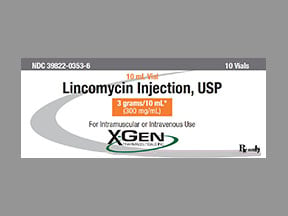
Lincocin Coupons & Savings Card – Discount Prices from $28.88
Brand for: Lincomycin
My prescription
Edit
10ML of 300MG/ML, Lincomycin (1 Vial)
Select pharmacy

CVS
$86.08
COUPON PRICE
Albertsons
$28.88
COUPON PRICE
Walgreens
$64.90
COUPON PRICE
Walmart
$71.81
COUPON PRICELincocin savings card
Show this card to your pharmacist
Albertsons
$28.88
BIN
ID
PCN
GRP
019876
LH51FF1641
CHIPPO
LHX
Powered by
Related lincosamide antibiotics prescriptions
More prescriptions for bacterial infection
Related lincosamide antibiotics prescriptions
More prescriptions for bacterial infection
Price history for Lincocin (brand) & Lincomycin (generic)
1 Vial, 10ML of 300MG/ML
Average retail price for Lincocin
Average retail price for Lincomycin
Average SaveHealth price for Lincomycin
Our price history data is based on aggregated prescription data collected from participating pharmacies in America. Our prescription data updates daily to reflect the latest price changes. If you notice a missing data point, it means there wasn't sufficient data available to generate a monetary value for that date.
Over the last 12 months, the average discount price of Lincocin is $91.74 using the SaveHealth savings card. That's an average savings of 40.79% on Lincocin with our discount card.
*Retail prices are based on pharmacy claims data, and may not be accurate when we don't have enough claims.
Lincocin (Lincomycin) dosage forms
Dosage Quantity Price from Per unit 10ML of 300MG/ML 1 Vial $28.88 $28.88 10ML of 300MG/ML 2 Vials $50.26 $25.13 10ML of 300MG/ML 3 Vials $71.64 $23.88
| Dosage | Quantity | Price from | Per unit |
|---|---|---|---|
| 10ML of 300MG/ML | 1 Vial | $28.88 | $28.88 |
| 10ML of 300MG/ML | 2 Vials | $50.26 | $25.13 |
| 10ML of 300MG/ML | 3 Vials | $71.64 | $23.88 |
What is LINCOCIN used to treat?
Lincocin is used to treat serious bacterial infections, particularly those caused by susceptible strains of streptococci, pneumococci, and staphylococci. It is often reserved for patients who are allergic to penicillin or when penicillin is not appropriate.
Is LINCOCIN the same as clindamycin?
Lincocin and clindamycin are not the same, but they are related. Lincocin is the brand name for lincomycin, while clindamycin is a derivative of lincomycin. Both belong to the lincosamide class of antibiotics and have similar mechanisms of action, but they are distinct medications.
Is lincomycin a penicillin?
Lincomycin is not a penicillin. It is an antibiotic that belongs to the lincosamide class, which is different from the penicillin class of antibiotics.
Can LINCOCIN treat a boil?
Lincocin, which contains the antibiotic lincomycin, can be used to treat bacterial infections, including skin infections like boils, if they are caused by susceptible bacteria. However, the appropriateness of using Lincocin for a boil should be determined by a healthcare professional, who can assess the specific situation and prescribe the correct treatment. It is important to follow the guidance of a healthcare provider for the management of boils.
Does lincomycin treat boils?
Lincomycin is an antibiotic that can be used to treat certain bacterial infections, including those that may cause boils. However, the effectiveness of lincomycin for treating boils depends on the specific bacteria involved. It is important for a healthcare provider to evaluate the condition and determine the most appropriate treatment, which may include lincomycin or another antibiotic.
